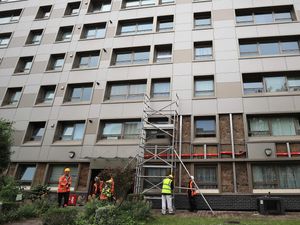Housebuilders Barratt and Redrow face bumper bills over cladding works
Barratt said its improvement works are expected to cost the business between £350 million and £400 million.

Housing giants Redrow and Barratt are facing hefty bills after pledging to carry out more fire safety works in the wake of the Grenfell tragedy.
FTSE 100 firm Barratt became the latest firm to promise improvements to the Government on Wednesday afternoon.
Barratt said its improvement works are expected to cost the business between £350 million and £400 million.
It came hours after Redrow set aside a further £164 million after vowing to carry out more fire safety works, taking the total costs of its safety provisions to £200 million.
They have become the latest firms to sign up to the Government’s new Building Safety Pledge, which commits developers to new guidelines for work on potentially unsafe cladding on buildings between 36ft (11m) and 59ft (18m) high.
Competitor MJ Gleeson also told shareholders on Wednesday that it has signed the pledge and is undertaking assessments on 15 buildings it helped to develop which are more than 36ft (11m) tall.
The company said it plans to complete the assessments by the end of June but did not highlight any cost impact.
It comes after fellow housebuilders Crest Nicholson and Taylor Wimpey also revealed increasing bills on Tuesday.
Barratt said it intends to recover some funds from other firms involved in the development process “who may have a responsibility to share the costs of remedial works” but stressed this process was uncertain.
David Thomas, chief executive of Barratt, said: “We have always been clear that we do not believe leaseholders should pay for remediation of their homes and are committed to helping affected leaseholders living in the buildings we developed.
“Through constructive engagement between industry and Government, a proportionate and sensible approach has been found and we look forward to completing the remediation process as quickly as possible.”
Redrow said it was largely involved in the development of high-rise apartments between 2000 and 2010 and primarily outsourced the design and constriction of those sites to contractors.
It said in a statement: “As reported in our interim results, we believe the housebuilding industry should play its part in resolving the issue of legacy fire safety in high-rise buildings and that the financial burden should not be borne by leaseholders.
“We will work with leaseholders to remediate their buildings and, where possible, pursue recoveries from main contractors, warranty providers and other third parties.
“As these recoveries are not certain, they have not been recognised in estimating the provision.
“These remediation works are expected to take a number of years to complete.”
MJ Gleeson chief executive James Thompson said: “Leaseholders should not have to pay for any costs associated with life-critical fire safety issues and I support the Government’s efforts to engage the wider industry in remediating buildings made unsafe by life-critical fire safety issues.
“The housebuilding sector has responded positively to this initiative and is playing a proactive role and at significant cost.
“We will continue to work constructively with DLUHC (Department for Levelling Up, Housing and Communities) and the wider sector to ensure that this issue is resolved expeditiously.”





